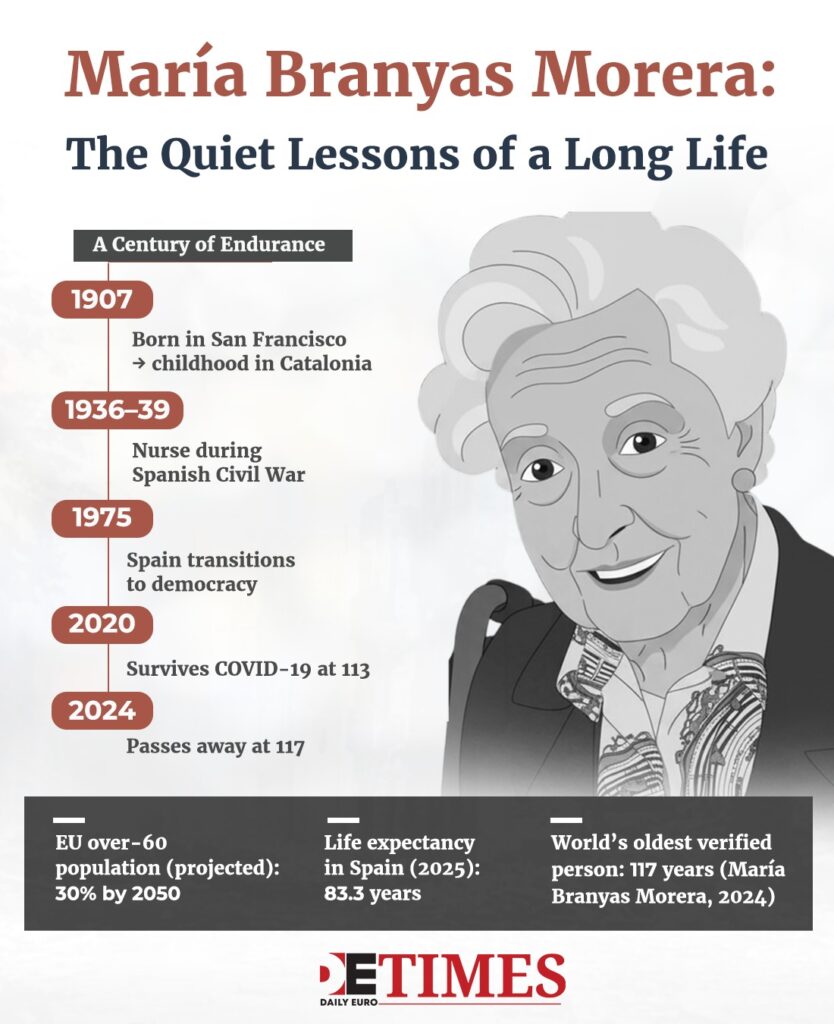When María Branyas Morera passed away in August 2024 at the age of 117, she was not only Spain’s oldest citizen but also the oldest verified person in the world.
Her death marked the end of a life that spanned three centuries, two world wars, and the reshaping of Europe itself. Born in San Francisco in 1907 and raised in Catalonia, she witnessed a continent recover from wars, dictatorships, and the disillusionment of modernity.
Branyas never sought attention. Her quiet endurance became known only after 2020, when she survived COVID-19 at 113. That moment made her a symbol of hope in Spain’s hardest months.
She lived the last decades of her life in a nursing home in Olot, surrounded by family, memory, and the slow rhythm of ordinary days.
A Witness to a Changing Europe
Her life traced the arc of a century that saw Europe rebuilt from ruins. She was a child when women couldn’t vote and lived to see them lead governments. She grew up when letters took weeks to arrive and saw her great-grandchildren talk instantly across continents.
During the Spanish Civil War, she served as a nurse; she saw her country pass from dictatorship to democracy. Her story was not one of grand gestures but of endurance through change; the kind of resilience that quietly defines Europe's postwar generations.
When asked the secret to her longevity, she answered simply: “Order, tranquility, and staying away from foolish people.” Her humour reflected something deeply Mediterranean. A belief that wisdom comes from moderation, not miracles.

What Longevity Means in Modern Europe
Europe is growing older.
By 2050, nearly a third of its population will be over 60.
Politicians frame this as a challenge; the “burden” of an aging society. Yet lives like Branyas’s remind us that longevity is not just a demographic curve but a measure of peace, health, and stability hard-won over a century.
She embodied what Europe rarely celebrates: the dignity of aging.
In a culture that prizes youth and reinvention, her calm persistence was a counterpoint. Longevity, in her case, was not about clinging to life but about living through change with grace.
Continuity Over Speed
Her daughter, Rosa Moret, said after her death that María “never lost curiosity about what came next.”
That curiosity, quiet and undramatic, is the essence of Europe’s endurance. The continent’s strength has often come not from revolution but from persistence, from carrying memory forward.
María Branyas lived long enough to see Europe survive its own worst impulses and rebuild into something freer and more humane. Her passing reminds us that progress, too, depends on patience and on lives that hold the line between what was and what still can be.
Keep up with Daily Euro Times for more updates!
Read also:
Gene Editing and National Laws: Who Sets the Boundaries?
When the Angels Return: How Victoria’s Secret is Shocking the New Era of Beauty
Belgium: Invisible Identities No More






